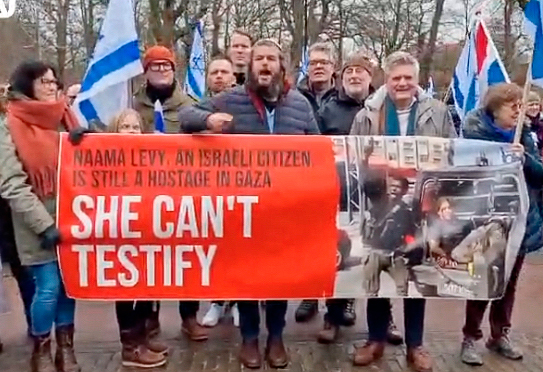Tens of thousands joined protests around the world over the Jan. 12 weekend to demand Hamas release all the remaining hostages the Tehran-backed group kidnapped as part of its murderous pogrom in Israel Oct. 7. The protests in London, Paris, Berlin, New York, Tel Aviv and other cities marked the 100th day of their captivity and mistreatment in Gaza.
There were events across Israel, including a 100-minute strike called by the Histadrut, the country’s largest trade union federation.
“If we maintain unity and solidarity,” David Arnon Bar, chairman of the Histadrut, told the rally of 100,000 in Tel Aviv Jan. 14, “we will overcome everything and rebuild everything they tried to destroy.”

The reactionary Islamist group cynically claimed at first that the more than 240 hostages it seized were well-treated “guests.” Taking hostages was a central objective of their pogrom. Some 1,200 people were murdered and more than 5,000 injured, mostly civilians, in what was the largest massacre of Jews since the Holocaust. Dozens of Arabs, Thais, Nepalese, Filipinos and African workers who worked with Jews were also killed or taken hostage.
The Israeli government is now making public more of the facts on how the Hamas death squads tortured, raped and mutilated many of their victims, and the sexual abuse and torture of hostages.
Agam Goldstein-Almog, a 17-year-old held captive by Hamas for 51 days, was one of the speakers at the Tel Aviv rally. She described what must be going through the minds of the women still captive. “Has he entered the shower again, stripped the pajamas that he gave you, touched the wound from the bullet that he shot, that really hurt you?”
Workers at Israel’s National Center of Forensic Medicine in Tel Aviv, who are still trying to identify the remains of the 1,200 who were murdered, described their findings to Yedioth Aronoth. One disturbing image was of a 12-year-old girl who was shot in the head by the Hamas thugs and then decapitated.
Showing its depravity, Hamas toys with the emotions of the hostages and their families. On Jan. 14, saying “tomorrow we will inform you of their fate,” the group published photos and a video of three hostages. The next day they said that Yossi Sharabi and Itai Svirsky were dead, claiming they’d been killed in Israeli airstrikes, but that they were still holding Noa Argamani, a 26-year-old woman.
Sharpening conflicts
There has been a sharp step-up recently in attacks by Tehran and its “axis of resistance” — Hamas, Lebanon-based Hezbollah, Tehran-organized and trained “militias” in Syria and Iraq, and Houthi-based forces in Yemen — on U.S. forces in the region.
These moves reflect the watershed effect on government alliances and actions in the region and worldwide since Oct. 7. They threaten to unleash wider combat and possible strikes by rulers possessing nuclear arsenals.
According to the Pentagon, there have been 130 drone, rocket, mortar and missile attacks on U.S. troops in Iraq and Syria over the last three months, injuring 69 soldiers.
There are some 2,500 U.S. soldiers stationed in Iraq, ostensibly to advise the Iraqi army in fighting the Islamic State group. Tehran and the militia forces it spawned in Iraq have been pressing the government there to expel U.S. forces from the country.
In a new escalation, Iran’s Revolutionary Guard Corps fired at least 10 ballistic missiles at what it claimed was an Israeli “espionage center” in Erbil Jan. 15 in the semi-autonomous Kurdish region of Iraq and at Islamic State bases in Syria. Ludicrously, Tehran claims the IS group is an agent of Israel.
Iraqi officials say the missiles hit the residence of a well-known Kurdish businessman, killing him and his 11-month-old daughter.
The violation of Iraqi sovereignty was so egregious that even the Iraqi government — which has integrated Tehran-allied militias into its armed forces — complained, recalling its ambassador.
Kurdistan Region Prime Minister Masrour Barzani said the attack shows that U.S. troops need to stay in Iraq.
At Tehran’s behest, Hezbollah has so far avoided launching a major assault on Israel. Instead, the group fires missiles and mortars a few miles into northern Israel almost daily. On Jan. 9 Hezbollah drones hit an Israeli army base near the border. On Jan. 14 an anti-tank missile hit a home in Kfar Yuval killing a woman and her son.
Israeli retaliatory strikes have killed over 135 Hezbollah fighters.
Tehran is behind the spate of attacks on ships in the Red Sea by Ansar Allah (supporters of God) in Yemen. The armed group based on the mostly Shiite Muslim Houthis — about 35% of the country’s population — has been fighting a civil war there against Saudi-backed former government forces for years. With arms and training from Tehran, the group controls most of the country.
Recently Houthi forces have launched dozens of missile and drone attacks at ships in the Red Sea, claiming they are involved in trade with Israel. The attacks caused a growing number of shipping companies — including from Qatar, where the regime has had friendly relations with Hamas and the Ansar Allah — to reroute ships, adding days of travel and extra expenses to avoid going through the Red Sea and Suez Canal.
Some 20% of the world’s container ships travel through the Suez Canal.
The U.S. and British military, with aid from the armed forces of Australia, Bahrain, Canada and the Netherlands, retaliated Jan. 11 and 12 for the Houthis’ latest attack targeting a U.S. ship, striking more than 60 targets in Yemen. U.S. officials say up to 80% of the group’s mobile launchers are still intact.
At the same time, the White House continues to press the Israeli government to wind down the war in Gaza. U.S. imperialism’s starting point is not defending Israel or Jews. What it wants is stability for Washington’s economic and political interests in the region.
The Times of Israel reported Jan. 11 that Secretary of State Antony Blinken — on his latest visit to Israel — told the Israeli cabinet they need to scale back combat in south Gaza, allow Gazans to begin returning to the northern part of the Strip, and declare it is ready to negotiate “a pathway to a Palestinian state.”
But the Israeli government has no intention of stopping the war in Gaza until Hamas is dismantled.
One of the reasons for the Oct. 7 timing of Hamas’ pogrom was Tehran’s hope to spark an Israeli response that would keep the government of Saudi Arabia from signing on to the “Abraham Accords.” That’s the name given to the normalization of diplomatic and economic relations with Israel by the governments in Bahrain, United Arab Emirates, Morocco and Sudan.
But that goal may be backfiring on Tehran’s “axis of resistance.”
“We’ve been at this for a long time, and willing to accept Israel for a long time,” Saudi Ambassador to the United Kingdom Prince Khalid bin Bandar told the BBC Jan. 9. “It’s a reality that’s there that we have to live with.”


